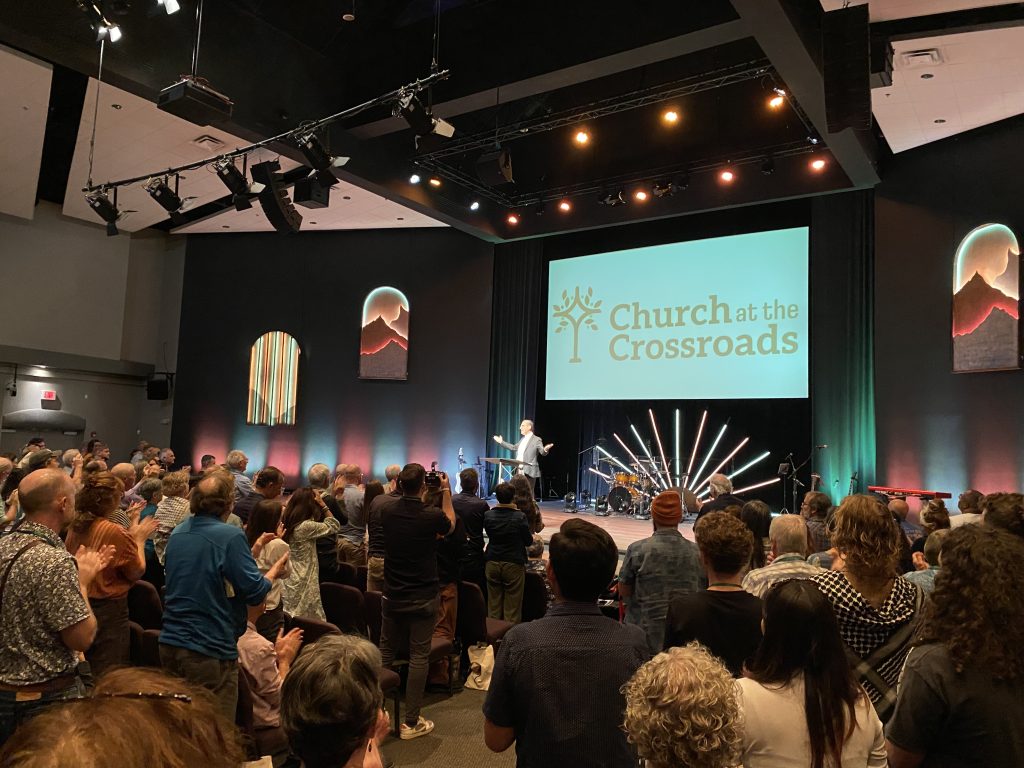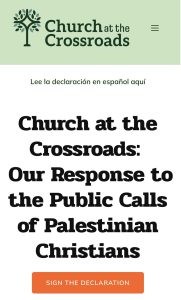Dear friends,
Last weekend, I attended the Church at the Crossroads conference in Glen Ellyn, Illinois. About 800 of us gathered together in person and online.
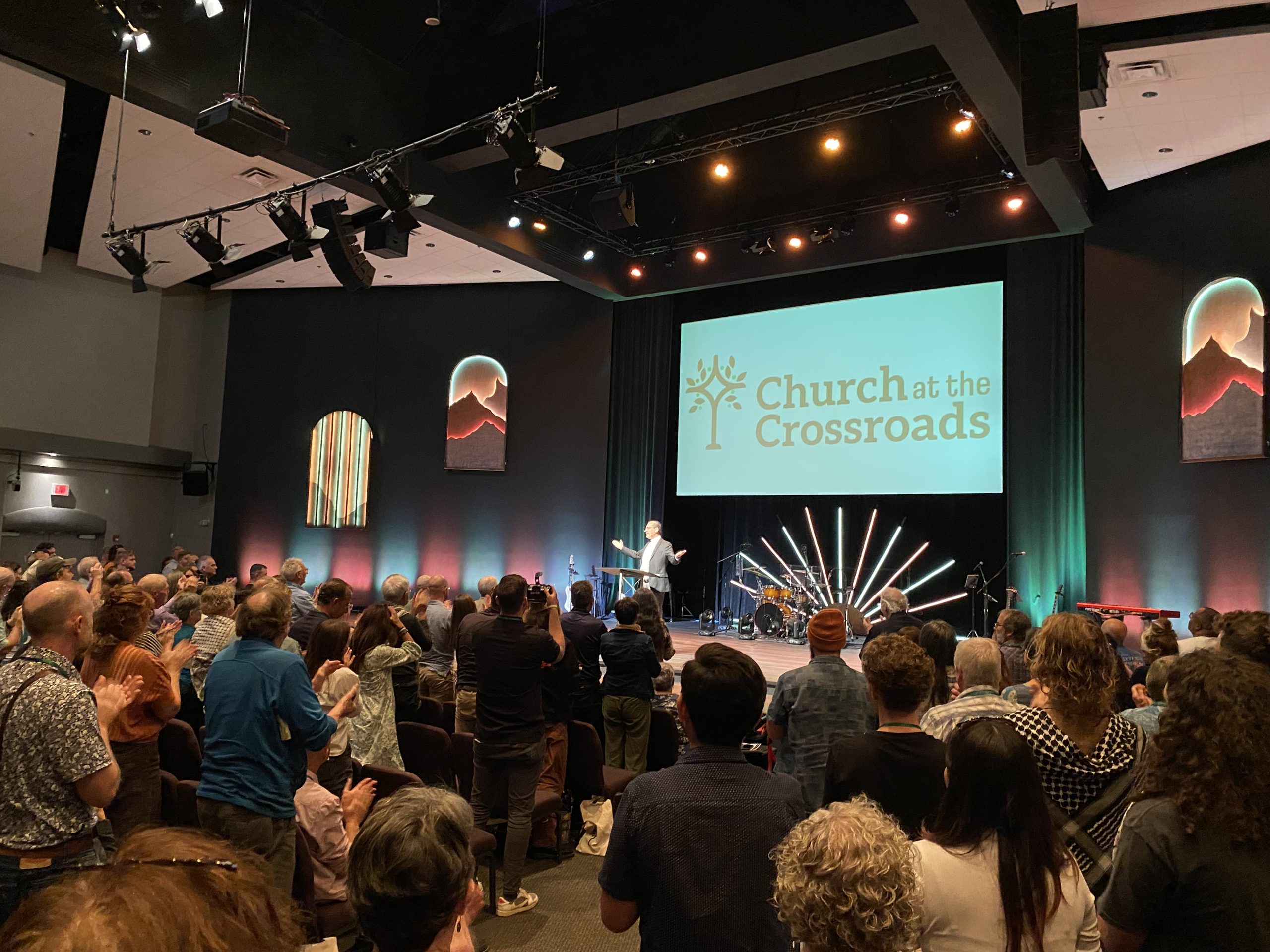
Rev. Munther Isaac greeted with a standing ovation.
This conference did something unusual and difficult. It invited American Christians to reckon with Israel’s devastation of Gaza. Our host, Daniel Bannoura, told the audience that if we’ve ever wondered how we might have responded to American slavery or the German Holocaust or apartheid in South Africa, we know by how we respond to Gaza today.
Unsurprisingly, the conference was intense. There were over fifteen official speakers and many more voices. They filled these two and a half days with profoundly inspiring but equally heartbreaking messages.
Looking back, here’s what most impressed me about the conference: its resolute commitment to the ethics of Jesus.
I saw this in three ways.
1. Unwavering Nonviolence
Every speaker affirmed an explicit, emphatic commitment to nonviolence. This was the unwavering consensus.
Recall the grim context. We heard again and again about Israel’s devastation of Gaza, including the killing of around 20,000 Palestinian children and the destruction of Gaza’s hospitals, schools, and homes. But I didn’t hear a single call for violence. I didn’t hear a single attempt to justify violence, whether with the Bible, theology, or political philosophy. I didn’t hear a single defense of Hamas’s violence on October 7th.
Again and again, all violence was condemned as a betrayal of Jesus’ teaching and our shared hope for a better future. Several speakers went out of their way to condemn the assassination of Charlie Kirk, who was a prominent supporter of Israel’s war against Gaza. A full workshop was dedicated to helping attendees wrestle with violent passages in the Bible and to disarm these verses as followers of Jesus – not to deploy them.
To be clear, this was no tame nonviolence. We repeatedly heard the call to condemn injustice, to disrupt oppression, and to struggle for our shared flourishing, even if it gets us into “good trouble” as John Lewis said. The drumbeat was to claim our responsibility and act. But violence had no role in this vision of liberation. None.
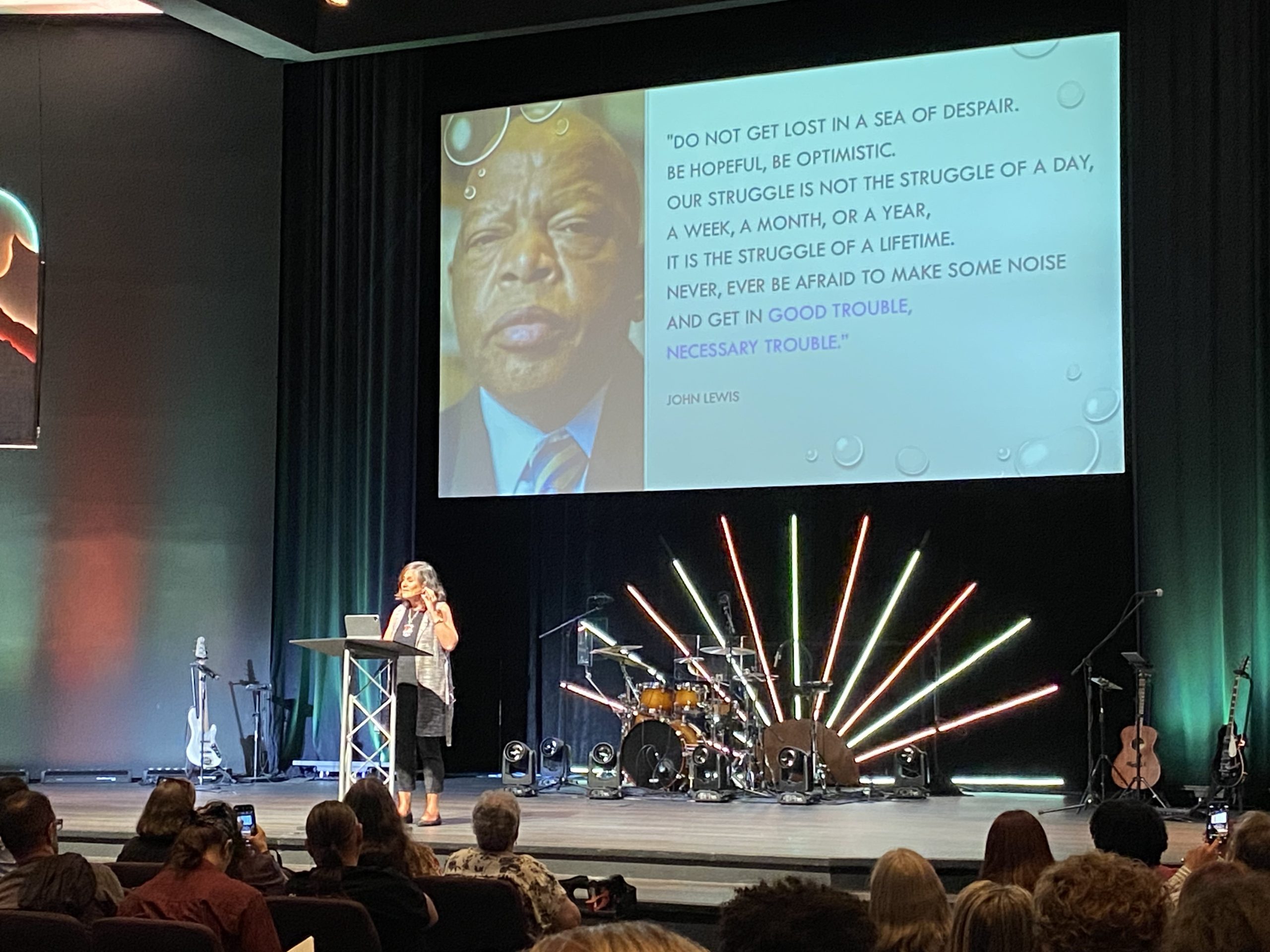
Dr. Ruth Padilla DeBorst speaks on Jesus’ call to justice
Violence has been normalized in American Christianity. The “just war tradition” is our bread and butter. Again and again, we hear arguments for why violent self-defense is a God-given right and why killing others can be an act of faithfulness to Christ. We twist ourselves into pretzels to explain why “Love your enemies” and “Blessed are the peacemakers” really means “You can kill people if necessary.” Most Christians I know assume this is obviously true and right. They find questioning it outrageous or ridiculous.
Church at the Crossroads offered an unmistakable contrast. Amidst Israel’s devastation of Gaza and the Palestinian people, the uncompromising call was to reject all forms of violence and to choose Jesus’ nonviolent way of creative resistance even at personal cost. The conference felt like a return to the first 300 years of Jesus’ movement in which nonviolence was the consensus for how to live in the world.
2. Human Dignity
The conference resolutely affirmed human dignity and condemned dehumanization.
Other people were consistently talked about as “image-bearers of God” and our “neighbors” to be loved. “Love your enemies” was a teaching of Jesus that I heard over and over again. This was the common sense: people are precious.
I didn’t hear a single insult against a Jewish person or Israeli. I didn’t hear a joke made against them or a generalization used – “They always…” or “Those people are…” I didn’t hear humans humiliated or compared to animals, demons, or monsters. No one was called “the enemy.” There was no talk of God judging or punishing “them” in the future. Antisemitism was repeatedly condemned as evil, and a workshop was offered on how to recognize antisemitism. Speakers told us not to reduce our love for Israelis but to enlarge our love for Palestinians.
What was condemned as the enemy were attitudes of supremacy and acts of violence – never a person or group. “Us versus them” thinking was repeatedly called out and challenged. From start to finish, injustice was the target of critique, regardless of who commits it – not an “enemy” or “other” or “them.”
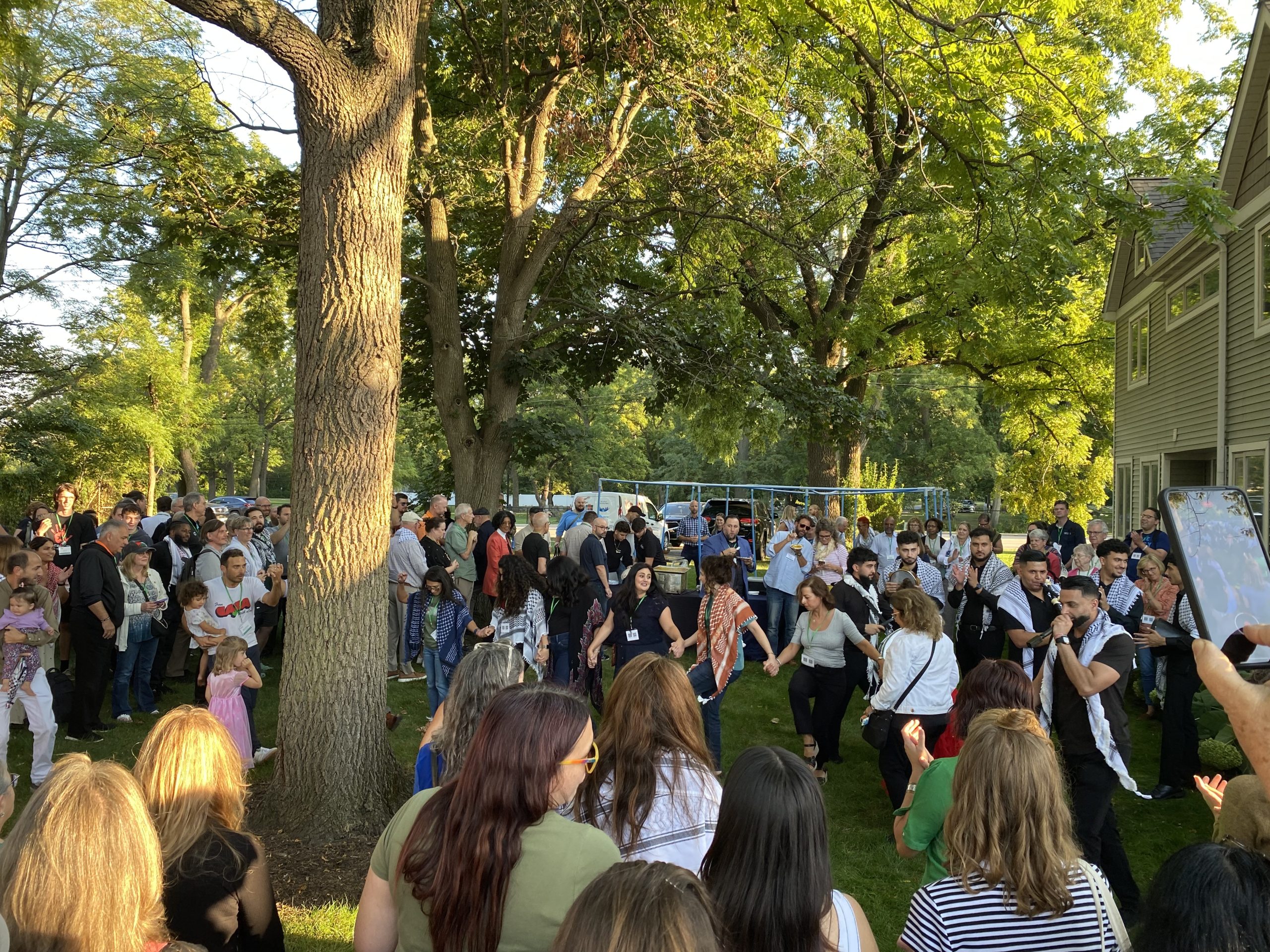
Amidst the grief, a moment of joyful dancing in community
Again, dehumanizing rhetoric is increasingly normalized in American culture and, sadly, also in American Christianity. It has become common to hear people called “criminals,” “animals,” “monsters,” or “demons.” Few of us seem disturbed by this pattern, even though it always opens the door to violence, which we’re seeing escalate today. The war of words leads to the war of weapons.
By contrast, I didn’t hear any of this dehumanizing language at Church of the Crossroads. This discipline is astonishing when we think about the horrifying context: thousands of children are being killed, people are being starved to death, and desperately-needed hospitals are being bombed and reduced to rubble. Yes, there was righteous passion to name and condemn injustice. But not people. People were referred to as God’s image, our neighbors, and morally responsible agents – not something “other” or “less” than anyone else.
3. The Jesus Way
Third, Jesus was the center of this resolute commitment to nonviolence and human dignity.
I can’t remember the last time I was at a gathering of Christians that talked more about Jesus. These people actually seemed to think that Jesus is God’s revelation and the way, the truth, and the life – not just a correct doctrine or ticket to heaven but the One we’re actually called to follow.
I didn’t hear this as simplistic but as simple, not as elementary but as elemental. The claim was clear: if we want to know how to read the Bible, how to treat other people, how to live our lives, look at the life of Jesus.
Again, this wasn’t some watered-down, “liberal” reduction of Jesus either. The focus was often on the death of Jesus and how Jesus himself said that he could call down angels to destroy his persecutors but instead chose to suffer with us and cry out to God for our forgiveness. We were told that the resurrection of Jesus promises all of us that this way of suffering love actually offers hope. You don’t win by force. You win by following Jesus and loving, no matter the cost.
Unsurprisingly, this conference frequently named the idols that Jesus also named: our addictions to greed, to putting our security above everything else, to having a superior status to someone else or power over someone else. This conference challenged us: do we truly want to follow Jesus, or do we want a spiritualized version of our culture with “Jesus” slapped onto it?
A Prophetic Invitation
I’ll be honest: this conference was difficult to attend. There were moments when I wanted to leave. The longer I live, the more I find the suffering of children unbearable to hear about or see – and the children of Gaza are suffering horrifically.
But I came away from this conference with this candle of hope: the movement Jesus started at the cost of his own life is still alive, even in the most extreme, heartbreaking conditions. There are imperfect people who are resolutely committed to his way – to nonviolence in the face of genocidal violence, to love of neighbor in the face of dehumanization, to the life of Jesus in the face of the horrors we fabricate.
At this stage in my life, I have many questions. Grief sometimes feels like it overwhelms joy. The evil in our world gags me and tempts me to despair. But I want to continue being part of this Jesus movement – this commitment to nonviolent love in which death is not the end but the beginning of a new life in which everyone is welcome and healing embraces us all.
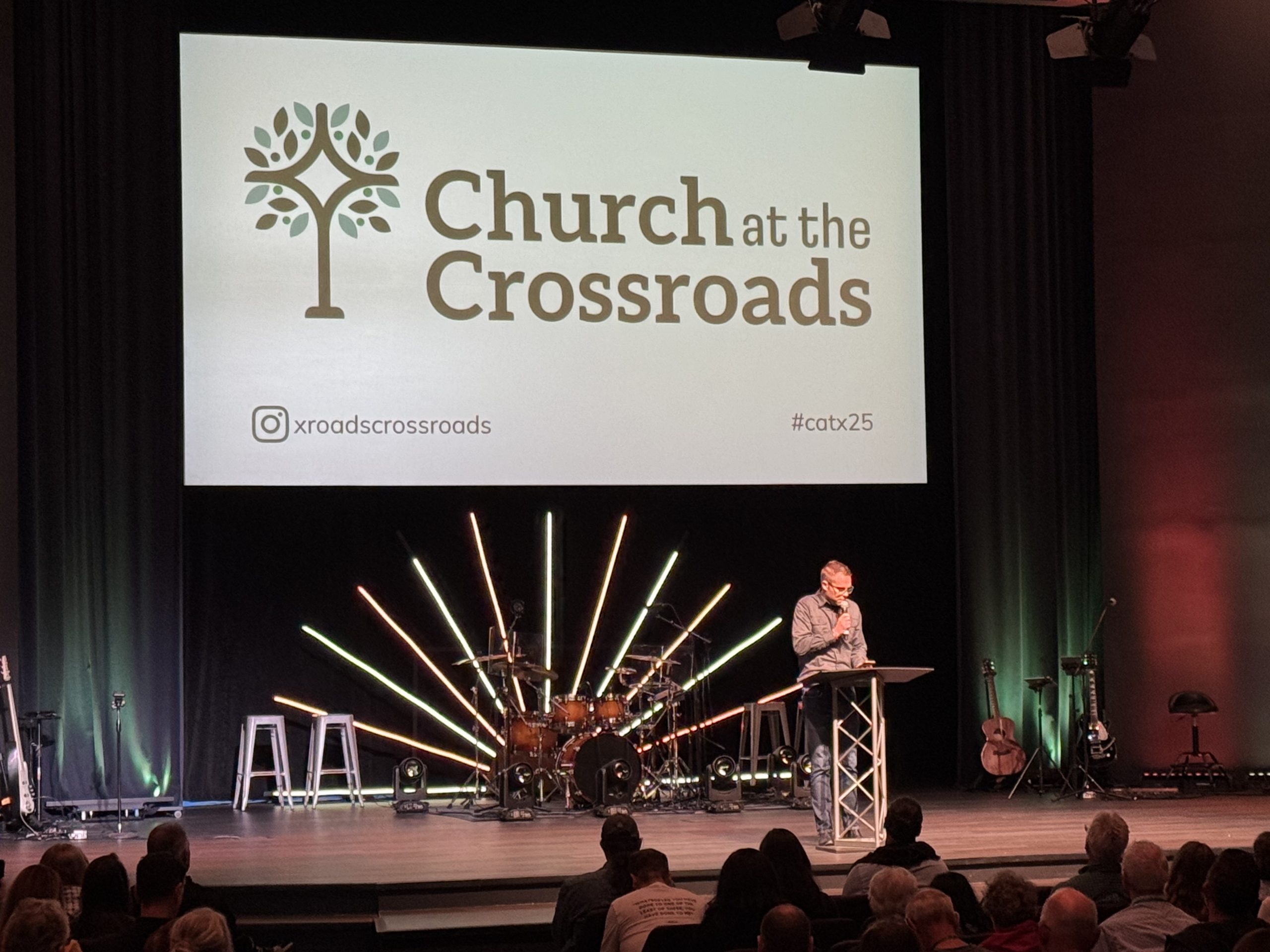
Andrew DeCort reads the conference’s public declaration.
If you share these values, I invite you to read and consider signing and sharing the conference’s public declaration here. I was privileged to facilitate the writing of this statement and read it at the close of the conference.
Let us raise our voices on behalf of our suffering neighbors in Gaza and refuse for this grave evil to continue in our names or the name of Jesus.
Yours with grief and hope,
Andrew



